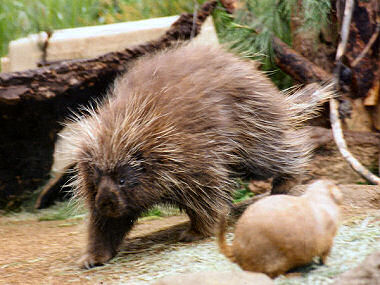The porcupine is a rodent with
brownish-yellow fur and strong, short legs. It has hairless soles on its
feet that help it climb trees and a round body, small ears and a small
head. The most recognizable feature of the porcupine is its quills which
are hairs with barbed tips on the ends. The porcupine has quills on all
parts of its body, except for its stomach. The porcupine is not an
aggressive animal, it will only attack if it is threatened. When a
predator approaches, the porcupine will turn its back, raise the quills
and lash out at the threat with its tail. If the porcupine hits an animal with its quills,
they break off and become embedded. The porcupine lives in coniferous,
deciduous and mixed forests. In the west, it can be found in scrubby
areas. The animal is a herbivore, feeding on leaves, twigs and green
plants. In the winter, it may eat bark and will often climbs trees to
find food.
threat with its tail. If the porcupine hits an animal with its quills,
they break off and become embedded. The porcupine lives in coniferous,
deciduous and mixed forests. In the west, it can be found in scrubby
areas. The animal is a herbivore, feeding on leaves, twigs and green
plants. In the winter, it may eat bark and will often climbs trees to
find food.
|
The porcupine at right was
photographed in a zoo, although I have seen a porcupine in Arizona
at the north rim of the Grand Canyon. |
Porcupines are mostly nocturnal, but will sometimes
forage for food in the day. They mate in late summer and early fall.
Seven months after mating the female gives birth to a single baby. When
the baby is born, its quills are soft, hardening about an hour after
birth. The baby is begins to forage for food after only a couple of
days, but will stay with its mother for about six months. Porcupines are
solitary animals, although it may den with other porcupines in the
winter. It makes its den in caves, decaying logs and hollow trees. The
common porcupine doesn't hibernate, but it may stay in its den during
bad weather. |

